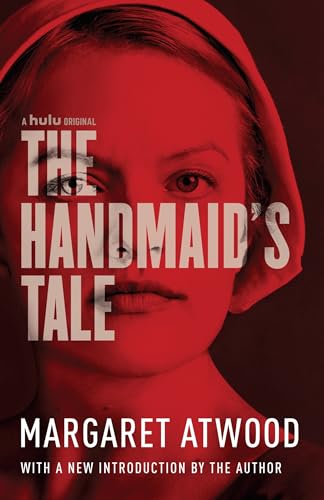The Handmaid's Tale (Movie Tie-in)
Margaret Atwood
BOOK REVIEW

There's something utterly haunting about The Handmaid's Tale, a narrative that not only challenges our understanding of freedom but also exposes the raw brutality of a dystopian regime that feels uncomfortably close to our reality. Written by the legendary Margaret Atwood, this landmark work resonates with an intensity that transcends its fictional bounds, presenting a chilling reflection of societal fears that rattle the foundations of liberty and identity.
Atwood's dystopia doesn't just exist in the realm of fiction; it mirrors our world's existential struggles. Set in the oppressive theocratic state of Gilead, where women are stripped of their autonomy and relegated to mere vessels for reproduction, we are thrust into the life of Offred, a Handmaid whose narrative encapsulates despair and resilience. As she grapples with loss and the yearning for freedom, readers are beckoned to confront their own complicity in societal structures that diminish the voice of the marginalized.
Diving into Offred's psyche is like peeling back the layers of an onion, revealing the raw emotions of a woman who once enjoyed the freedom of choice, now forced into submission. Atwood crafts her with such depth that you feel Offred's fear seep into your bones. The anxiety of being caught, the bittersweet memories of better times, and the flickering hope for a future shrouded in uncertainty-these elements abound, making you feel every tremor of her existence.
But this narrative isn't merely a personal tale; it is a visceral critique of patriarchy and power. Critics often point out how Atwood's work draws parallels with contemporary socio-political events, engaging readers in a dialogue about the dangers of complacency in the face of oppressive systems. Many have noted the book's relevance to modern-day discussions around bodily autonomy and women's rights, invoking passion on both sides of the spectrum. Supporters laud Atwood for her prescience and ability to provoke critical thought, while detractors argue that the work leans towards melodrama, threatening to overshadow more nuanced discussions with its heavy-handed approach.
Yet to dismiss the emotional resonance of The Handmaid's Tale is to overlook its power. As readers, we are compelled to confront the quiet horrors that mar our reality, where rights can be rescinded with the stroke of a pen. This is not simply a story; it is a clarion call to recognize the fragility of freedom. With poignant metaphors and vivid imagery, Atwood draws us into a world where the mundane becomes terrifyingly extraordinary. Whether it's the chilling rituals of the Aunts or the sinister enforcements of the Eyes, we are immersed in a symphony of fear and rebellion.
As if propelled by a fever dream, the narrative unfolds, leaving us breathless. What resonates significantly is Offred's mantra: "Nolite te bastardes carborundorum," which translates to "Don't let the bastards grind you down." This relentless urge to resist, to find hope amidst despair, has sparked movements and conversations since the novel's release. It has not only influenced literary landscapes but also ignited grassroots activism, reminding us that literature can be a powerful tool for change.
The adaptation into a popular television series has further amplified its impact, captivating a new generation who might not have encountered Atwood's masterpiece otherwise. The series, while visually and thematically stunning, stirs the pot of critique further-some fans argue it enriches the narrative, while others feel it strays too far from the profound psychological depths the novel encapsulates.
In the end, The Handmaid's Tale is not simply about a world gone awry; it's a mirror reflecting our own biases and societal constructs. It forces you to ponder the extent to which you value freedom, and whether you're willing to stand up for those who are silenced. Atwood's haunting prose, rife with emotion and insight, ignites a passion that resonates long after the last page is turned. As we navigate the murky waters of our own time, this tale serves as both a warning and an inspiration, compelling us to act before we, too, are ensnared in silence. 🌍✨️
📖 The Handmaid's Tale (Movie Tie-in)
✍ by Margaret Atwood
🧾 336 pages
2017
#handmaids #tale #movie #margaret #atwood #MargaretAtwood